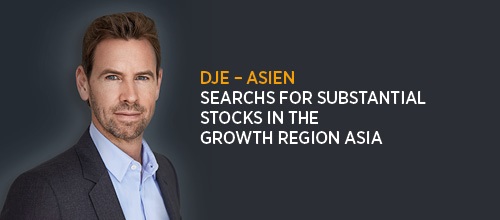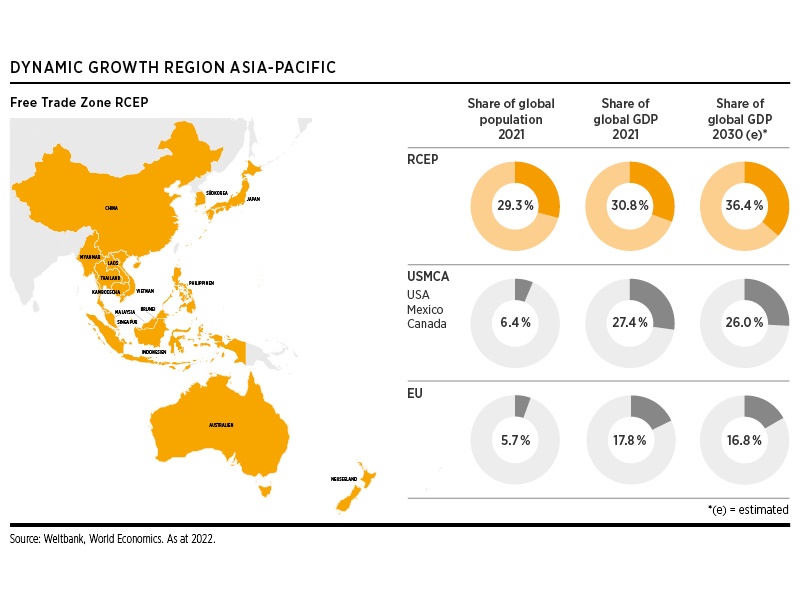
Key information
DJE - Asien invests primarily in solid companies with promising growth prospects in the Asia-Pacific region. The fund management seeks to identify investments with attractive valuations and shareholder-friendly corporate policies such as capital returns and share buybacks (total shareholder return). The fund allocation is independent from market benchmark and uses decades of experience and in-depth Asian expertise of DJE research team to deliver a positive performance.
Responsible manager since inception
Key information
| ISIN: | LU0374456654 |
| WKN: | A0Q5KZ |
| Category: | Fund Asia-Pacific Equity |
| Minimum Equity: | 51% |
| Partial Exemption of Income ¹: | 30% |
| VG/KVG: | DJE Investment S.A. |
| Fund Manager: | DJE Kapital AG |
| Risk Category: | 4 |
| This sub-fund/fund promotes ESG features in accordance with Article 8 of the Disclosure Regulation (EU Nr. 2019/2088). | |
| Type of Share: | distribution |
| Financial Year: | 01.01. - 31.12. |
| Launch Date: | 01/08/2008 |
| Fund currency: | EUR |
| Fund Size (18/09/2024): | 82,93 Mio EUR |
| TER p.a. (29/12/2023): | 1,98% |
| Reference Index: | - |
Fees
| Initial Charge: | 5,000% |
| Management Fee p.a.: | 1,650% |
| Custodian Fee p.a.: | 0,060% |
|
Performance Fee p.a.: 10% of the [Hurdle: exceeding 6% p.a.] unit value performance, provided the unit value at the end of the settlement period is higher than the highest unit value at the end of the previous settlement periods of the last 5 years [High Water Mark Principle]. The settlement period begins on 1 January and ends on 31 December of a calendar year. Payment is made at the end of the accounting period. For further details, see the sales prospectus. |
Ratings & Awards (18/09/2024)
| Morningstar*: |
|
All ESG information presented here relates to the fund portfolio shown and is sourced from MSCI ESG Research, a leading provider of environmental, social and governance analysis and ratings.
| MSCI ESG RATING (AAA-CCC): | A |
| ESG-Qualityrating (0-10): | 6,897 |
| Environment Rating (0-10): | 5,723 |
| Social Rating (0-10): | 5,804 |
| Governance-Rating(0-10): | 5,184 |
| ESG rating in comparison group (0% lowest, 100% highest value): | 45,180% |
| Peergroup: |
Equity Asia Pacific ex Japan
(684 Fonds) |
| Coverage rate ESG rating: | 79,864% |
| Weighted average CO₂ intensity (tons of CO₂ per 1 million US dollars in sales): | 126,381 |
Portfolio allocation according to ESG rating of individual securities
Report date: 30/08/2024
- The fiscal treatment depends on the personal circumstances of the respective client and can be subject of change in the future.
- is proprietary to Morningstar and/or ist content providers may not be copied or distributed and is not warranted ob e accurate, complete or timely. Neither Morningstar nor ist content providers are responsible for any damages or losses arising from any use of this information. Past performance is no guarantee of future results.
Perfomance Chart
Performance in Percent
Rolling performance in %
Risk metrics (18/09/2024) |
|
|---|---|
| Standard Deviation (2 years): | 13,92% |
| Tracking Error (1 years): | - |
| Value at Risk (99% / 20 days): | -9,16% |
| Maximum Drawdown (1 year): | -13,99% |
| Sharpe Ratio (2 years): | -0,57 |
| Correlation (1 years): | - |
| Beta (1 years): | - |
| Treynor Ratio (1 years): | - |
Country allocation total portfolio (% NAV)
*Note: Cash position is included here because it is not assigned to any country or currency.
Data: Anevis Solutions GmbH, own illustration 30/08/2024
Top Country Allocation in % of Fund Volume (30/08/2024) |
|
|---|---|
| Japan | 30,37% |
| Cayman Islands | 18,18% |
| Hong Kong | 10,84% |
| Bermuda | 8,13% |
| Taiwan, Province Of China | 6,78% |
Asset allocation in % of the fund volume (30/08/2024) |
|
|---|---|
| Stocks | 92,71% |
| Cash | 7,29% |
Investment strategy
DJE - Asien invests primarily in companies with attractive and promising business models from the Asia-Pacific region. The RCEP free trade zone (Regional Comprehensive Economic Partnership), which was established in 2020, is the largest in the world in terms of its share of global GDP and is expected to contribute to the region's dynamic growth (see chart). The fund allocation is based on our proprietary fundamental top-down (FMM methodology) and bottom-up analysis. We believe that the combination of global macroeconomic analysis along with bottom-up security selection is essential to balance opportunities and risks. The focus of the fund is companies with attractive revenue and earnings growth, stable earnings, potential for innovation and a leading competitive position. The fund management allocates across regions, countries, and sectors of the Asian economic area, independent from any market benchmarks.

Chances
- Excellent demographic developments make long-term growth in investments in Asia possible
- The conditions for expansion in many Asian domestic economies, such as China, continue to exist
- Traditionally higher dividend payments mean that the fund can take advantage of the compounding effect of reinvested dividends
Risks
- Equity prices may exhibit relatively strong fluctuations depending on market conditions
- Currency risks resulting from a high proportion of foreign investments
- Issuer country and credit risks
Target group
Der Fonds eignet sich für Anleger
- who wish to reduce risk compared to a direct investment
- with a medium to long-term investment horizon
- who seek to focus their equity investments on stocks that pay dividends
Der Fonds eignet sich nicht für Anleger
- with a short-term investment horizon
- who seek safe returns
- who are not prepared to accept increased volatility
Monthly Commentary
The Asian stock markets started August with some volatility, especially in Japan and Hong Kong, while China, India, Korea and Indonesia, among others, were calmer and tended to move sideways. Weak US labor market data at the beginning of the month raised fears that the USA could slide into a recession. In addition, a (moderate) increase in key interest rates by the Bank of Japan jeopardized the usual interest rate differential business, the so-called yen carry trade. As a result, the Japanese stock index Topix suffered a daily loss of -12.2%, which also affected the Hong Kong stock exchange. After August 5, the Japanese and Hong Kong markets were able to make up most of their losses. In China, the ailing real estate market continues to weigh on consumption and retail. In order to strengthen domestic demand, the Chinese government made 300 billion renminbi (approx. 39 billion euros) available to subsidize the exchange of expensive consumer goods and production facilities in the second half of the year. The purchasing managers' index for the manufacturing sector fell for the fourth time in a row in August, falling to 49.1 points (previous month: 49.4), indicating a shrinking economy. The index for services remained stable at 50.3 points (previous month: 50.2). Against this market backdrop, the DJE - Asien fell by -0.89%. At sector level, the Asian investment region showed a mixed picture in August. The real estate (overweight in the fund), industrial (overweight in the fund) and consumer discretionary (overweight in the fund) sectors performed best in relative terms. The healthcare (underweight in the fund), telecommunications (underweight in the fund) and technology (underweight in the fund) sectors performed worst in relative terms. Overall, the sector weighting had a negative impact in August on the fund price development relative to the comparison index. At the individual stock level, the highest performance contributions came from the positions of the Chinese company Great Eagle Holdings (real estate/hotels), the Japanese company KDDI Corp. (telecommunications) and the Chinese company Guangdong Investment (utilities, real estate). In contrast, the positions of the Japanese company Sumitomo Mitsui Financial Group (bank), the Chinese company Kingboard Laminates Holdings (specialty chemicals/laminates) and the Japanese company Tokio Marine Holdings (insurance) had a negative impact. The fund management adjusted the allocation over the course of the month: the overweight in the real estate and utilities sectors was increased. The overweight in the industrial goods & services, banks and insurance sectors was reduced. The underweight in the consumer goods, healthcare and food & beverages sectors was reduced. The underweight in the financial services and technology sectors was increased. At the country level, the share of Chinese and Hong Kong Chinese stocks increased. In contrast, the share of Japanese and South Korean stocks decreased. Due to the adjustments, the investment rate rose to 92.71% (previous month: 89.65%).
